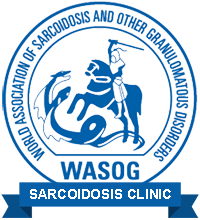Can TERT rs2853669 polymorphysm indicate fibrosis in sarcoidosis?
Telomerase polymorphism in sarcoidosis
Keywords:
sarcoidosis, telomerase, fibrosis, genetic polymorphism, mutationAbstract
Background and aim: Sarcoidosis is a systemic inflammatory disease of unknown cause, characterized by the presence of non-caseating granulomas, which can affect all organs in the body, especially the lung. The fibrotic stage 4 of sarcoidosis usually does not respond adequately to treatment and may cause respiratory distress in the patient. Some telomerase gene polymorphisms have been significantly associated with lung cancer and idiopathic pulmonary fibrosis. In our study, we aimed to investigate the relationship between telomerase mutation and progression to fibrosis in patients with sarcoidosis.
Methods: A total of 93 patients, including 18 males and 73 females, who were clinically and histopathologically diagnosed with sarcoidosis were included in the study. The 78 patients included in the study were classified as non-fibrotic and 15 as fibrotic sarcoidosis. In telomerase rs2853669 single nucleotide polymorphism, three genotypes, homozygous TT, homozygous CC and heterozygous TC, were determined as the genotypes of the patients.
Results: When non-fibrotic and fibrotic sarcoidosis groups were compared, no significant difference was found in terms of genotypes (p=0.76). The FEV1 (forced expiratory volume in the first second) % of the CC genotype was lower than that of the other genotypes (p=0.01).
Conclusions: In sarcoidosis patients, telomerase rs2853669 polymorphism does not indicate progression to fibrosis, but since FEV1% was found to be lower in individuals with homozygous CC polymorphism, it is thought that it may predict loss of respiratory function. Further studies are needed to evaluate the association of telomerase polymorphisms with fibrosis in sarcoidosis.
References
Stock CJW, Renzoni EA. Telomeres in Interstitial Lung Disease. J Clin Med. 2021 Mar 30;10(7):1384. doi: 10.3390/jcm10071384.
Hunninghake GW, Costabel U, Ando M, et al. ATS/ERS/WASOG statement on sarcoidosis. American Thoracic Society/European Respiratory Society/World Association of Sarcoidosis and other Granulomatous Disorders. Sarcoidosis Vasc Diffuse Lung Dis 1999; 16(2): 149-73.
Bordignon M, Bargagli ME, Agostini C, et al. TLR7 Gln11 Leu single nucleotide polymorphism in patients with sarcoidosis. Sarcoidosis Vasc Diffuse Lung Dis 2013; 30; 157-161.
Sastre L, Molina-Molina M, Perona Abellón R. Telomere-related gene mutations and lung diseases: Pulmonary fibrosis, emphysema and lung cancer. Barc Respir Netw Rev 2019; 5(3): 184-200.
Diaz de Leon A, Cronkhite JT, Katzenstein A-LA, et al. Telomere lengths, pulmonary fibrosis and telomerase (TERT) mutations. PloS One 2010; 5(5): e10680. doi: 10.1371/journal.pone.0010680.
Armanios MY, Chen JJ-L, Cogan JD, et al. Telomerase mutations in families with idiopathic pulmonary fibrosis. N Engl J Med 2007; 356(13): 1317-26. doi: 10.1056/NEJMoa066157.
Meyer KC. Interstitial lung disease in the elderly: pathogenesis, diagnosis and management. Sarcoidosis Vasc Diffuse Lung Dis 2011; 28; 3-17.
Snetselaar R, Van Oosterhout MF, Grutters JC, et al. Telomerase reverse transcriptase polymorphism rs2736100: a balancing act between cancer and non-cancer disease, a meta-analysis. Front Med 2018; 5: 41. doi: 10.3389/fmed.2018.00041.
Bhat G, Bhat A, Verma S, et al. Association of newly identified genetic variant rs2853677 of TERT with non-small cell lung cancer and leukemia in population of Jammu and Kashmir, India. BMC cancer 2019; 19(1): 1-8. doi: 10.1186/s12885-019-5685-2.
Liu Z, Wang T, Wu Z, et al. Association between TERT rs2853669 polymorphism and cancer risk: A meta-analysis of 9,157 cases and 11,073 controls. PloS One 2018;13(3):e0191560. doi: 10.1371/journal.pone.0191560.
Wei R, Li C, Zhang M, et al. Association between MUC5B and TERT polymorphisms and different interstitial lung disease phenotypes. Transl Res 2014; 163(5): 494-502. doi: 10.1016/j.trsl.2013.12.006.
Mushiroda T, Wattanapokayakit S, Takahashi A, et al. A genome-wide association study identifies an association of a common variant in TERT with susceptibility to idiopathic pulmonary fibrosis. J Med Genet 2008; 45(10): 654-6. doi: 10.1136/jmg.2008.057356.
Fingerlin TE, Murphy E, Zhang W, et al. Genome-wide association study identifies multiple susceptibility loci for pulmonary fibrosis. Nat Genet 2013; 45(6): 613-20. doi: 10.1038/ng.2609.
Afshar H, Abedini A, Nadji SA, et al. Telomere length assessment in blood leukocytes of patients with sarcoidosis. Sarcoidosis Vasc Diffuse Lung Dis 2021; 38(1): e2021009. doi: 10.36141/svdld.v38i1.10705.
Guan JZ, Maeda T, Sugano M, et al. An analysis of telomere length in sarcoidosis. J Gerontol A Biol Sci Med Sci 2007; 62(11): 1199-203. doi: 10.1093/gerona/62.11.1199.
Maeda T, Guan JZ, Higuchi Y, et al. Aging-related alterations of subtelomeric methylation in sarcoidosis patients. J Gerontol A Biol Sci Med Sci 2009; 64(7): 752-60. doi: 10.1093/gerona/glp049.
Kouranos V, Ward S, Kokosi MA, et al. Mixed ventilatory defects in pulmonary sarcoidosis: prevalence and clinical features. Chest. 2020 Nov;158(5):2007-2014. doi: 10.1016/j.chest.2020.04.074.
Downloads
Published
Issue
Section
License
Copyright (c) 2023 Sümeyye Kement, Black Sea Advanced Technology Research and Application Center, Biotechnology Unit, Ondokuz Mayıs University, Samsun, Eda Turgut Ugurtay, Aslı Tanrıvermis Sayıt, Pınar Tascı, Meftun Unsal

This work is licensed under a Creative Commons Attribution-NonCommercial 4.0 International License.
This is an Open Access article distributed under the terms of the Creative Commons Attribution License (https://creativecommons.org/licenses/by-nc/4.0) which permits unrestricted use, distribution, and reproduction in any medium, provided the original work is properly cited.
Transfer of Copyright and Permission to Reproduce Parts of Published Papers.
Authors retain the copyright for their published work. No formal permission will be required to reproduce parts (tables or illustrations) of published papers, provided the source is quoted appropriately and reproduction has no commercial intent. Reproductions with commercial intent will require written permission and payment of royalties.

This work is licensed under a Creative Commons Attribution-NonCommercial 4.0 International License.








